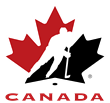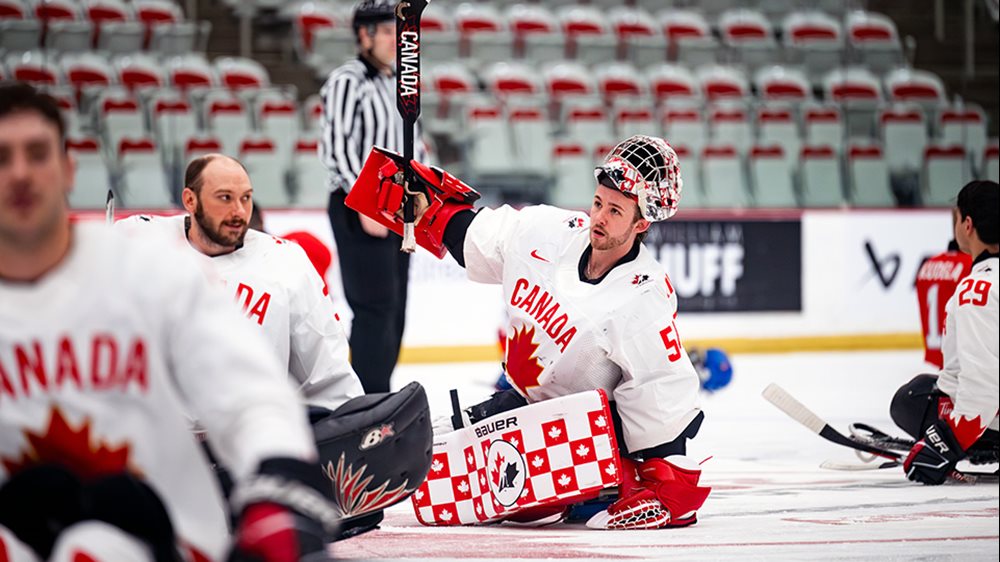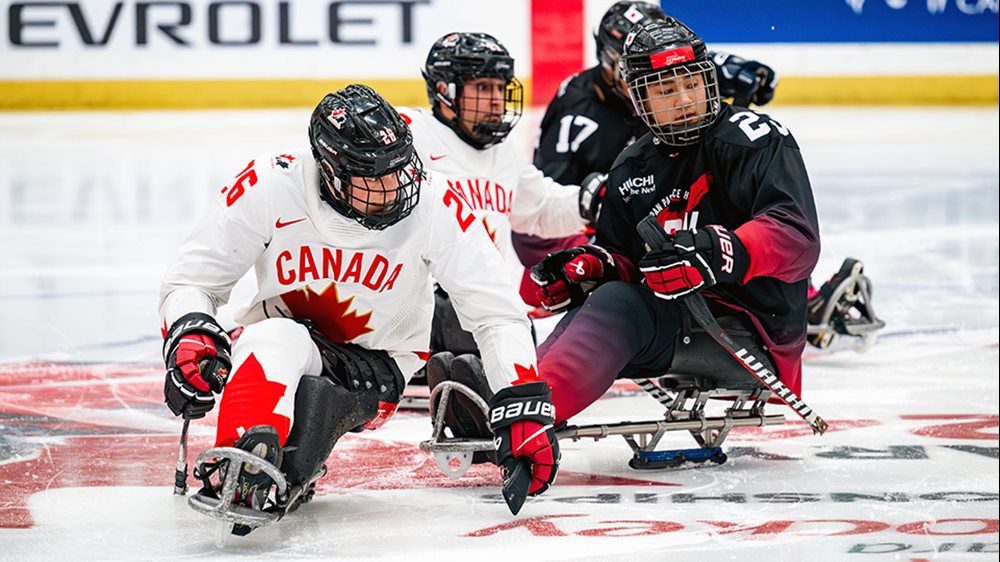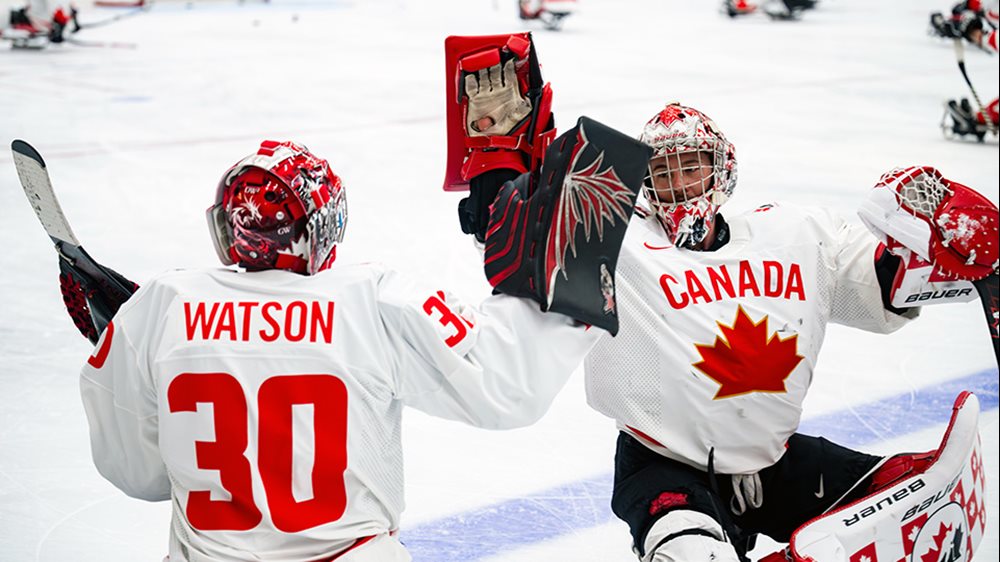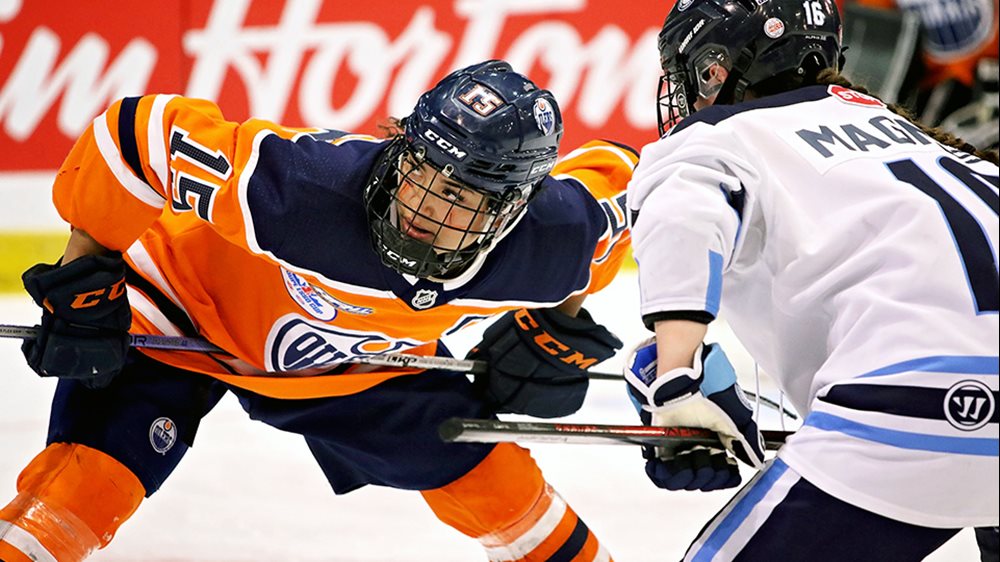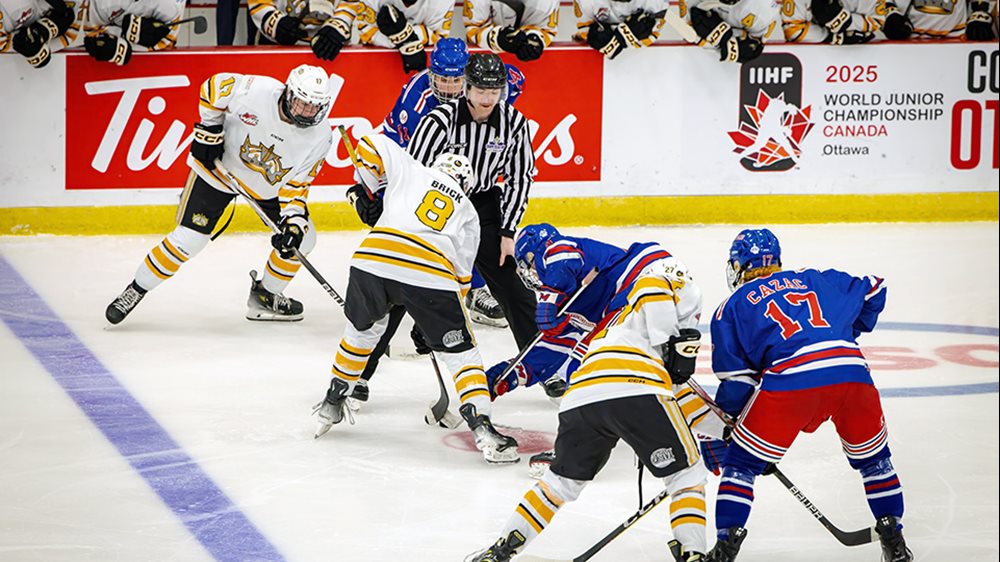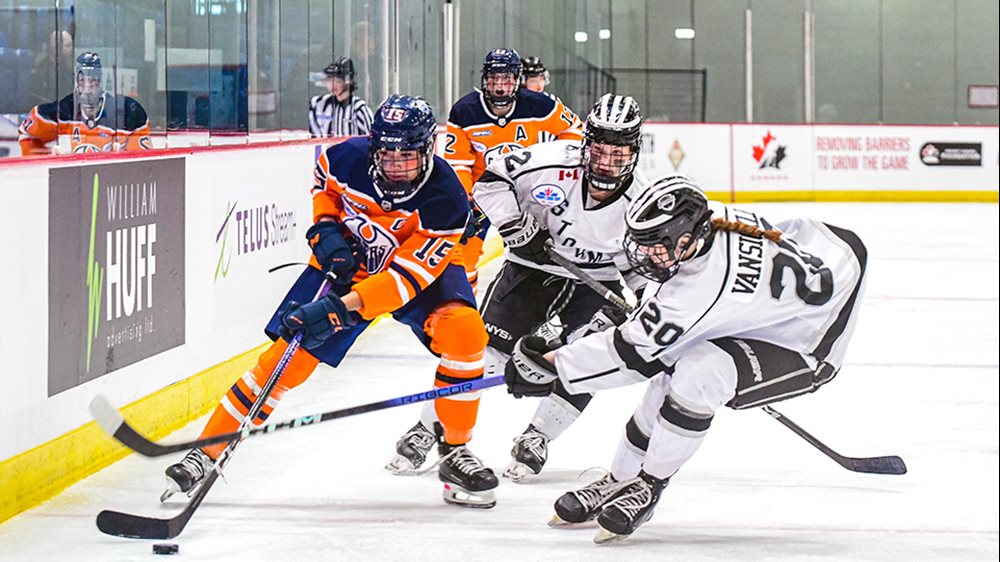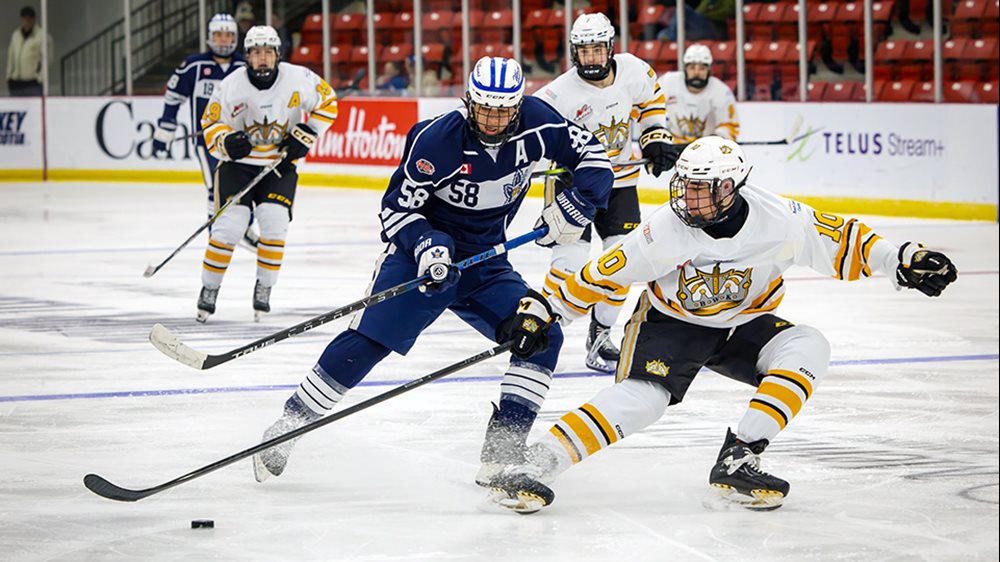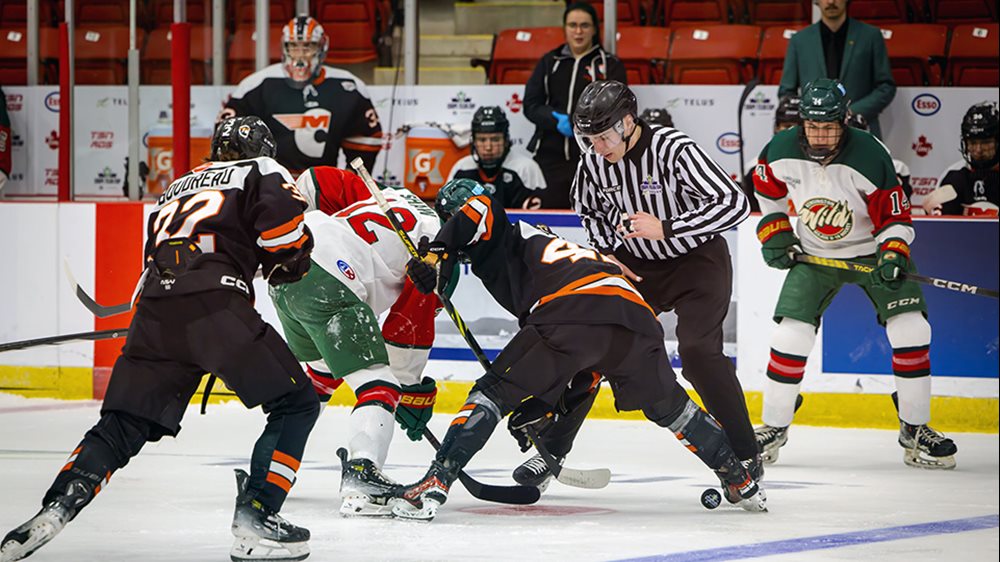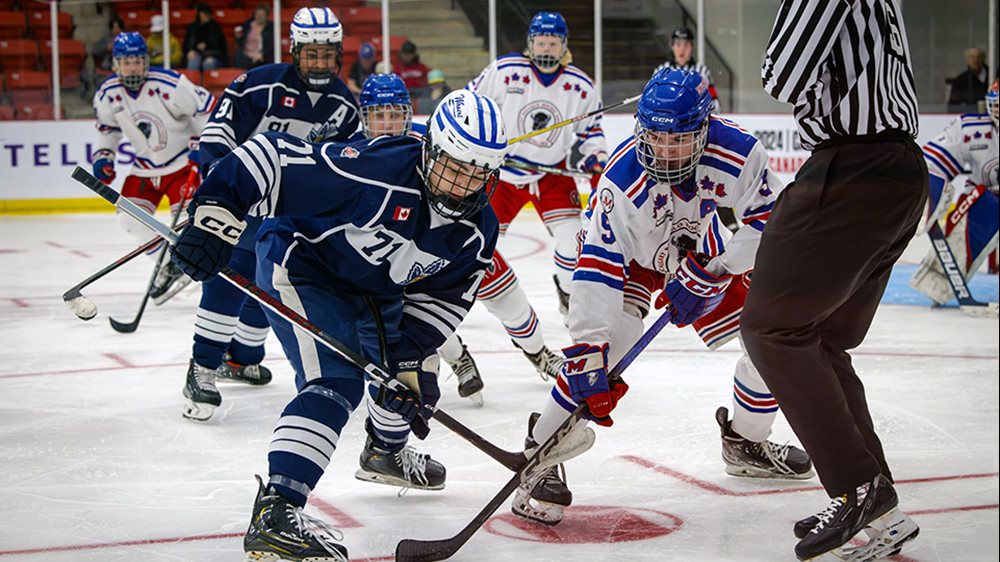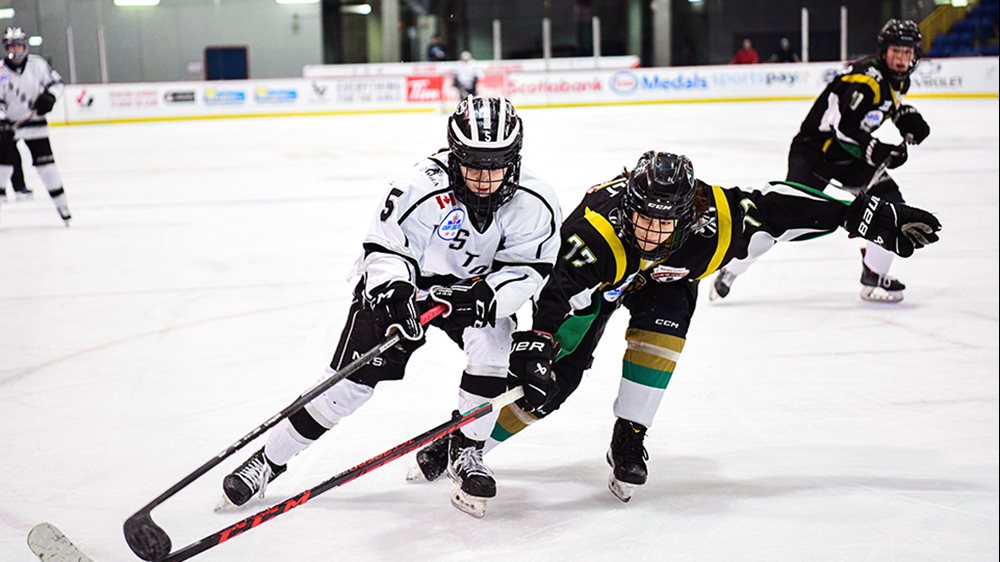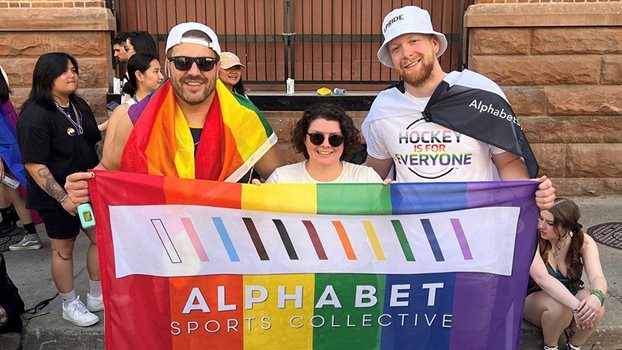
In my own words: Bayne Pettinger
The NHL agent talks about coming out, his work with Hockey Canada and making the game safer and more inclusive for the queer community
COVID-19 changed my life … in the best way possible. Strange, I know.
I was out to my family and close friends for a couple of years before the pandemic hit. But I lived in this world where I was running around, pushing deep thoughts to the back of my mind, saying, “I’ll deal with that later.” It was a fear of combining my personal life and my professional life.
But when COVID hit, I got to go home to Victoria. The world stopped, and so did my life as I knew it. The phone wasn’t ringing and the emails weren’t coming. The things that kept me occupied. It gave me the chance to sit down and have honest conversations.
I remember talking to Tyson Barrie, who was a client of mine and a good friend going back to our days growing up on Vancouver Island, and saying, “Hey, you know what? I think I’m going to come out.”
I thought maybe I’d just do an Instagram post, something simple. But Tyson and some other important people in my life thought I could really do something impactful, that I could be a face for the queer community in the game, because it was something hockey desperately needed.
So that started my journey. I began coming out to others, to big names in the game who I had crossed paths with through the years. When I told Connor McDavid, his response was simply, “Okay, that doesn’t matter.” I got a text from Sidney Crosby, who congratulated me and let me know he was there if I ever needed anything.
On Nov. 5, 2020, with the help of an article in The Athletic by Pierre Lebrun, I came out publicly.
Without discrediting how important my coming out was for my mental health, nobody really cared. It didn’t change how the hockey community saw me. Instead, it was … “Hey, you’re Bayne. You don’t judge us on who we date or who we’re attracted to. So why would we judge you?”
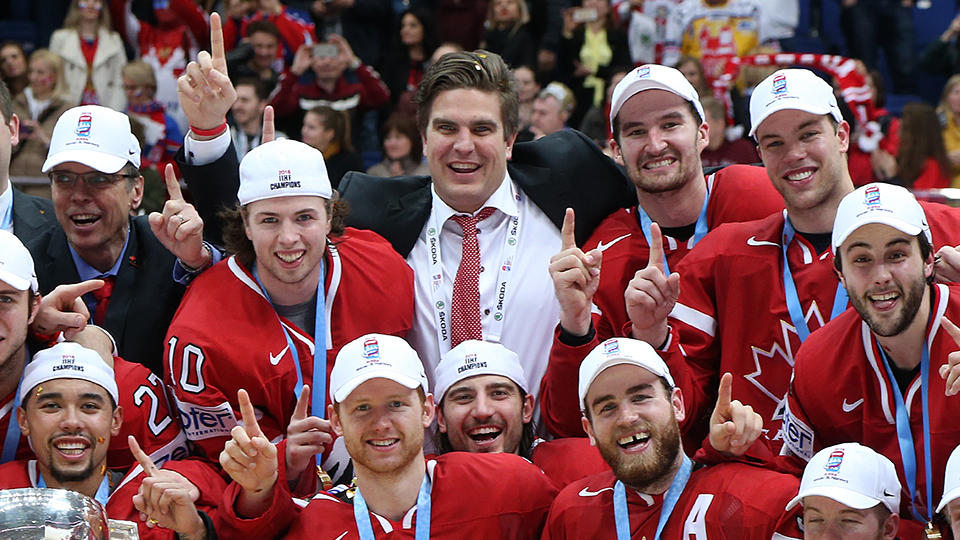
I got my foot in the door with Hockey Canada as an intern in the finance department in 2009 (I’m not much of a numbers guy, but it was the only position available at the time). From there I joined the hockey operations department in 2011, and my first assignment was the 2012 World Juniors in Alberta. I was travelling the world with Team Canada, riding these highs of winning gold at the Olympics, the IIHF World Championship and the World Juniors. And I was hanging around with a who’s-who of hockey, whether it’s Doug Armstrong, Jon Cooper, McDavid or Crosby. I left Hockey Canada in 2019 to become a certified NHLPA agent with CAA (Creative Artist Agency) and relocated to Toronto, finding my niche in the game and my personal happiness.
But there was always this fear that I couldn’t live my true life – to be accepted as a gay man – and also be a successful young executive in the game. It was a conundrum that kept me in the closet for a long time.
And it was that fear I needed to break down. It’s human nature – you always think the craziest things are going to happen, right? You’re going to tell someone and they’re going to not be your friend anymore. You get these thoughts in your head that you won’t be accepted or pushed out of hockey for some reason.
But that’s not what happened.
When I look back, I wonder why I was so anxious. And that’s what I try to preach to people who have reached out that are still in the closet thinking they won’t be accepted. The amount of outreach I had from people around the world, in the hockey world specifically, saying, “Hey, great for you. That’s awesome. You’re going to do great things,” was amazing. Just the overall support from friends, family, and even strangers was surreal to say the least.
And by no means did I ever think I’d become a face of being a queer man in hockey. But once I crossed that threshold and people reached out, I’m happy to speak on it. I think it’s important because you have to be out there and not everyone has the voice or platform to speak up.
That’s one of the reasons I helped launch the Alphabet Sports Collective (ASC) in March. We are a queer-led, not-for-profit that is empowering queer youth. Working with my co-chair, Brock McGillis, and ambassadors like Gord Miller, Jon Cooper, Morgan Rielly, Tessa Bonhomme – the support has been absolutely amazing.
We want to get our community to feel good about themselves. So if they want to work at Hockey Canada, or they want to be a sports agent, or they want to play in the NHL, now they have those faces, those supporters. Because I’m a strong believer that if you’ve never seen something done in front of you, you can’t tie to that and see yourself in those positions.
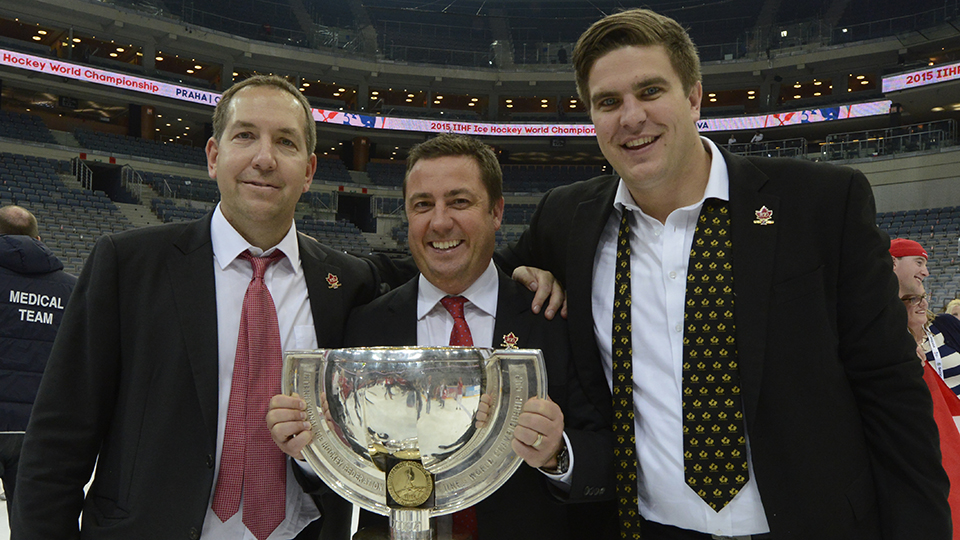
I’ve kind of come full circle now and I’m working with Hockey Canada as part of their ED&I (equity, diversity and inclusion) Task Team. I’ve really enjoyed it. I think it’s important to have representation from all walks of hockey.
For me, the key is showing vulnerability. Hockey Canada needs to get out there and listen to the issues and not think it has all the answers. We can write all the policies we want, run all the seminars we want. But we have to get to the grassroots of it. We need to hear the voices of the community, and there are groups out there that have done the work and understand the issues at hand. We don’t need to reinvent the wheel – we need to listen and learn.
I’m really proud Hockey Canada has this new group and it is listening and taking notes and not just rushing out a statement. Anyone can put out a statement. Let’s actually learn and implement new procedures and training so we’re not just spinning the wheel and checking the box. That’s the goal.
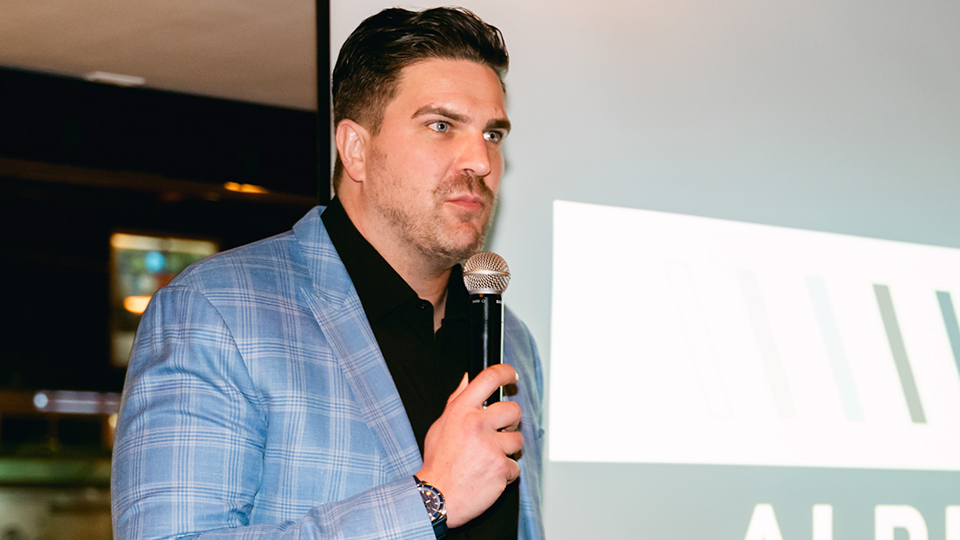
So now for the million-dollar question – where do we go from here?
I think it’s representation. To get the queer community empowered and feeling good about themselves, and then get a member of the community on the Hockey Canada board, get members of the queer community on NHL boards, get them on minor hockey boards, get them coaching, get them as trainers. To get that representation at the governance level, to have that voice and have that perspective, that’s the ultimate goal. Every community needs to be represented. People of colour, people of different religious backgrounds, people of the queer community. Because that’s what makes up Canada. So, if we’re really going to have a board that represents our country, then we need to have a queer seat there.
I want to get it out there and have open conversations and try and educate and humanize, but we’re not going to change everyone’s minds, and that’s not what we’re trying to do. We’re trying to say that the rights that you have, the equality, the celebrations, we want that for queer people.
I think sports are behind the rest of society. If I worked at a bank, I wouldn’t even really have to come out. It’s a big deal in hockey because there has never been anyone that’s done it, and it’s a hypermasculine sport, and we don’t talk about our feelings. We just play hockey and it’s the crest on the front, not the name on the back. Don’t bring your personal problems here – that’s how I was raised in the world of team sports.
But I think with some of the things we’ve seen in the news recently surrounding Pride nights, we’ve actually broken that down a bit and had honest conversations and opened people’s eyes that this is still an issue, that there are still some bigoted views and that it’s not a safe place for everyone yet.
The latest from last week, that NHL teams will no longer wear pregame jerseys for any causes, is disappointing to say the least. Nobody seems to want to focus on the 700+ players who supported our cause and wore Pride jerseys last season, it’s all about the miniscule group that refused. Pride nights (not to mention Hockey Fights Cancer, military appreciation and Indigenous celebrations) were successes across the league, and it’s sad to see the decision that was made.
With all that said, I truly think change is coming, and it starts with our youth.
I coach a U14 minor hockey team in Toronto. When I came out to them, their response was, “Whatever.” It didn’t change anything with them. When I came out to some of my young clients, it was, “It makes you happy and we’re happy for you.”
They’re understanding, they’re compassionate and they really don’t care, but in a good way. A lot of people seem to have a poor opinion of millennials – that they play too many video games and they’re lazy and the old “back in my day, I didn’t do that” mantra. But we’re at a point where the next generation is so eyes-wide-open and accepting that I find the future really promising, and I really think we’re in good hands on diversity and inclusion with our youth coming up.
To finish, I want those that are struggling to know that they’re not alone. There are resources, and there are people to talk to to help you feel accepted. It’s human nature to focus on the negatives, but there are a lot of us trying to break down barriers so queer people feel comfortable working or playing sports and living as their authentic self.
I would never want to be pushed away from the game I love because of sexual orientation. And I thought that was the case for a while, but it’s been the exact opposite.
Who knew? The big, bad hockey world isn’t that big and bad after all.
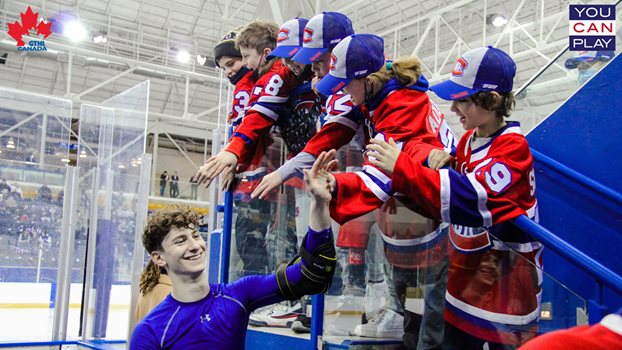
Inclusion not exclusion: The GTHL and You Can Play
Nearly a year after partnering with You Can Play, the Greater Toronto Hockey League remains more committed than ever to creating a safe space for 2SLGBTQ+
Last August, the Greater Toronto Hockey League (GTHL) entered a three-year partnership with You Can Play, a non-profit organization that works to ensure the safety and inclusion of 2SLGBTQ+ athletes, coaches and officials in sports, including hockey.
Since then, You Can Play has provided inclusion training to the GTHL Board of Directors, staff, coaches, athletes and others, reaching roughly 300 participants in the game. The GTHL, the world’s largest minor hockey organization, has also worked to highlight You Can Play in its social media efforts and leaned on it for support in participation in events such as the Pride Parade.
Scott Oakman, executive director and chief operating officer with the GTHL, talked to Hockey Canada about the partnership with You Can Play and the impact it has had on the organization.
Hockey Canada (HC): Why did you decide to partner with You Can Play?
Scott Oakman (SO): Our strategic plan was developed and released in early 2022, and then an independent committee report we had done on racism and discrimination identified that we should be putting high priorities on partnering with organizations that represent underrepresented communities in sport. You Can Play is a great example of one of those organizations ... that we've partnered with to help us learn and educate all our stakeholders from our board right through the staff and people within the GTHL on the particular issues facing the LGBTQ+ community.
HC: What are some of the areas the GTHL has focused on in the first year of the partnership?
SO: Our relationship with them is kind of multi-tiered. We have education pieces, we have celebration pieces, we have policy review pieces and You Can Play have been an excellent partner for us in terms of helping us better understand how we can change our organization and educate people to make sure that everyone feels welcome.
We really focused on organizational leadership in the first year. We're looking at doing things with You Can Play leaders so they can start to educate people within our individual organizations on how they can have a positive impact.
HC: What kind of impact has You Can Play had on the GTHL? SO: They've created a comfort level where we are not intimidated to ask difficult questions and they're prepared to give us straight and honest answers. As that comfort level grows with organizations and teams, I only see us having greater success with them.
We have a resource where when [a team within the GTHL] faces challenges, they can call You Can Play and get advice. It has been tremendous and we're now trying to spread the word further among the organization that these resources are available for them to take advantage of.
HC: What has the response been from players, coaches, officials and others?
SO: It's been incredibly well received. We've had situations where teams have run into some challenges internally and You Can Play has gone in and supported them. I think that's been replicated in a number of instances with some of the work that You Can Play has done one-on-one with some of our teams and in the collective education work that they've been doing with us.
HC: What are the next steps for the GTHL with regard to You Can Play? SO: We certainly want to trickle the education down. Staff have been through a bunch of stuff this year with the ongoing education. We are starting some team-based proactive education, as opposed to reactive after something's happened. The bigger challenge will be how we can roll out, on a larger scale, the education that's available through You Can Play to be able to capture on an ongoing basis, all our participants, so that it is not just a box that gets checked. We want to provide education on an ongoing basis in a format that isn't overwhelming, where it isn’t all front-loaded, and it's more ongoing through the course of the season and small touch points.
We are trying to stick handle a way to have positive communication, reaching all our participants on an ongoing basis, so they are better positioned to understand the issues that are faced [by 2SLGBTQ+] and ensuring that people on their teams are creating a welcoming environment and a safe environment for everyone.
Heidi Johnston, sports partnership manager with You Can Play, also talked to Hockey Canada about the work it does, why it matters and its relationship with the GTHL.
HC: What is the overall goal of You Can Play?
Heidi Johnston (HJ): Our mission is around creating safety and inclusion for the LGBTQ+ community and we do that mainly through education. We also participate in a bunch of pride events, and parades. We also work with the NHL to promote their Pride Month.
HC: Talk about You Can Play's education work; what do you do with teams and players?
HJ: A part of what we do is educating the coaches who have the most direct impact and connection with their kids and players. It's things like how to deal with a kid that might come out. Our training for the entire team is about the importance of pronouns, the importance of people being able to express themselves however they want and that your teammate is your teammate no matter what.
We also do activities that are helpful for the players to engage and one of those things is creating a logo around who they are as a person. The goal is for everybody to see that we are all different and logos are all different and it is that diversity that makes communities, especially hockey, great.
HC: What is your relationship with the GTHL?
HJ: Our relationship is really based on around education. We provide a lot of education for the league, for coaches, for refs and when an incident does come up, we will intervene and then provide training for that specific team or group of individuals. We have done six or seven team training in the eight months I've been with You Can Play. We've had an opportunity to educate 20 plus players with parents in such a short time and we've also done very large ref training and training with the coaches.
It's an incredible partnership because of how dedicated they are to really wanting to make change. Having a group the size of the GTHL, really committed to creating diversity to creating safe spaces, you know, for their coaches, their players and their staff is incredible. We are able to magnify our impact by having a partner like the GTHL.
HC: Why is the work you are doing important? Why does it matter?
HJ: LGBTQ+ kids have the highest incidence of suicide, and the research suggests that 83 per cent of fans who are openly gay don't feel safe as a spectator and 86 per cent of LGBTQ+ say they don't play a sport at school. So, it matters from an acceptance perspective. Every kid should be able to play and have the opportunity to be part of a team. Sports should be for everyone and anyone who wishes to participate regardless of gender or sexual orientation.
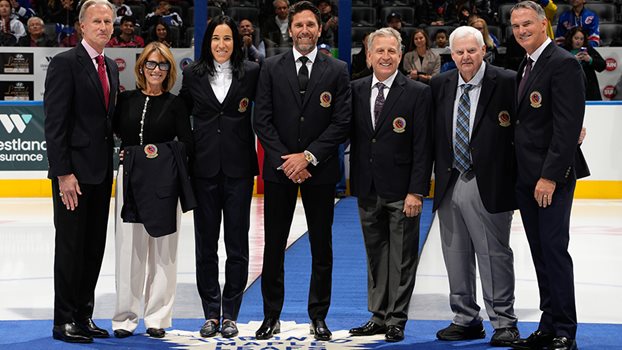
Fab five headed to the Hall
Hitchcock, Lacroix, Ouellette, Turgeon and Vernon part of Class of 2023 for Hockey Hall of Fame
There will be a distinctly Canadian flavour when the Class of 2023 goes into the Hockey Hall of Fame this fall.
Of the seven names announced Wednesday, five have a Canadian connection – Caroline Ouellette, Pierre Turgeon and Mike Vernon will be enshrined in the player category, while Ken Hitchcock and Pierre Lacroix will go in as builders.
A closer look at the inductees…
Caroline Ouellette is one of the most decorated players in international women’s hockey history, winning four Olympic gold medals and six golds at the IIHF Women’s World Championship during a 20-year career with Canada’s National Women’s Team.
The Montreal native recorded 242 points (87-155—242) in 220 games, ranking third in all-time Team Canada scoring. She finished her Olympic career in style, wearing the ‘C’ as Canada topped the podium at Sochi 2014. Ouellette was at her best on the game’s biggest stage, finishing with 26 points (9-17—26) in 20 Olympic games.
In addition to her Team Canada exploits, Ouellette won four Clarkson Cup championships with the Canadiennes/Stars de Montréal in the Canadian Women’s Hockey League (CWHL), claiming CWHL MVP honours in 2008-09 and 2010-11.
Pierre Turgeon made just a single appearance for Team Canada, scoring three goals in six games at the 1987 IIHF World Junior Championship.
He recorded 1,327 points (515-812—1,327) during a 19-year NHL career with six teams – Buffalo, the New York Islanders, Montreal, St. Louis, Dallas and Colorado – winning the Lady Byng Trophy in 1992-93.
Mike Vernon had a pair of experiences in the Maple Leaf, backstopping Canada’s National Junior Team to bronze at the 1983 IIHF World Junior Championship before winning silver with Canada’s National Men’s Team at the 1991 IIHF World Championship.
The Calgary product appeared in six games across his two appearances, posting a 2-2 record with a 3.78 goals-against average.
During a 19-year NHL career spent with Calgary, Detroit, San Jose and Florida, Vernon fashioned a 2.98 GAA and .889 save percentage across 782 games, winning Stanley Cups with the Flames (1989) and Red Wings (1997) and earning the Conn Smythe Trophy in 1997.
Ken Hitchcock was a familiar sight behind the Team Canada bench in the 2000s, serving as an assistant coach at four Olympics (2002, 2006, 2010, 2014), winning three gold medals. He was Canada’s head coach at the IIHF World Championship in 2008 (silver) and 2011, was an assistant at Worlds in 2002 and helped Canada to a World Cup title in 2004.
He got his first taste of international hockey as an assistant at the 1988 IIHF World Junior Championship, winning gold.
The Edmonton native coached the Dallas Stars to the Stanley Cup in 1999 and won the Jack Adams Award as NHL coach of the year with the St. Louis Blues in 2011-12, highlights of a 23-year head coaching journey that included 849 wins – fourth in NHL history – with five teams (Dallas, Philadelphia, Columbus, St. Louis, Edmonton).
Pierre Lacroix, who passed away in 2020 and will be inducted posthumously, spent 20 seasons with the Colorado Avalanche (including one with the Quebec Nordiques before the franchise relocated to Denver in 1995) as general manager and then president, building a team that won Stanley Cup championships in 1996 and 2001.
The quintet will officially be inducted on Nov. 13 at the Hockey Hall of Fame in Toronto, joined by fellow inductees Tom Barrasso and Henrik Lundqvist.

Continuing to be better
As manager of athletics at Olds College and member of the LGTBQ+ community, Trina Radcliffe is working to instill the values of giving back to all Broncos athletes
Trina Radcliffe’s life has come full circle as the manager of athletics at Olds College.
The positive impact she’s making on students goes beyond athletics, as she works with the college to make it an inclusive and safe space for all.
When you arrive on campus at Olds College, you are welcomed by three flags flying proudly across the Alberta skies. Throughout the month of June, the red and white of the Canadian flag is anchored by the blue of the Alberta flag on one side, and the rainbow colours of the Pride flag on the other. It signifies the welcome, inclusive and safe space the institution is working to provide its staff, students and community.
Over the last decade, Olds College has worked to develop its Broncos athletics program, expanding to include basketball, volleyball, futsal, rodeo and women’s hockey. The growth that Broncos Athletics has seen over the last five years can be credited to Radcliffe and the team she has built.
Radcliffe, originally from Oyen, Alta., is a product of her small-town roots. She grew up playing baseball and school sports, not because she was a standout on the court with her 5-foot-2 frame, but because the school needed her to have a team. In the winter, she could be found on the backyard rink built by her dad where she learned to play hockey with her three brothers. It wasn’t until she was 13 that she finally got to lace up for organized hockey. An hour away in Hanna they were starting a girls’ program. And as the story goes in small-town Alberta – they needed everyone to have a team.
“There was everything from nine-year-olds to 18-year-olds on that team. I was in the middle at 13 years old and loved the experience of playing hockey with girls,” says Radcliffe. “I’d always played hockey, but never got to play organized, just on the pond, so getting to play organized hockey for the first time was such an incredible experience.”
It was a twist of fate that led to a goaltending career. Radcliffe, who had played defence until then, was first in line to strap on the pads when the team’s goaltender got hurt. She was a natural between the posts and made the transition to goalie. It was a decision that paid off when she became the first goaltender for the women’s hockey team at Mount Royal College (now Mount Royal University) in the Alberta Colleges Athletic Conference (ACAC).
Taking the lessons she learned as part of a start-up team in small-town Alberta, Radcliffe applied the same techniques to starting the team at Mount Royal.
“You just go and talk to as many people as you can and convince them that it might be scary, but come out and give it a try,” offers Radcliffe. “Myself and my coach, Chris Dawe, were putting up posters saying, ‘Come try out,’ We had ringette players, we had people who had never played hockey before, who had only public skated before, could barely skate when they came to try out. We played in the intramural league, wearing the men’s old jerseys. We played until midnight some nights and then we played in exhibition tournaments with Augustana, Red Deer and Grant MacEwan, so that was kind of the start of women’s ACAC hockey back in 1998.”
Her role in starting the Mount Royal women’s team led Radcliffe to her next transition – from player to administration. During her last season with Mount Royal, she was coached by Shelly Coolidge, who was also the female development manager at Hockey Canada. Whenever Coolidge needed volunteers, Radcliffe was there. Because of the network she had built, Radcliffe eventually earned a full-time position with Hockey Canada as the female development coordinator before moving into the manager position.
In 2015, Radcliffe made the move to Olds College. She saw the move as a return to her small-town roots, but with the opportunity to stay connected to the network she had built over years of volunteering.
“I got to know people,” says Radcliffe. “Just building that network and volunteering. That’s still what I tell everyone. Just build your network, don’t worry about getting paid for everything that you do and volunteer. That’s basically how I got every job in sport since then.”
Radcliffe grew up in a family that gave back to the community through volunteering. Reaping the rewards of her own experiences, Radcliffe has asked the Broncos to give back and be involved in their community.
“We’ve seen our Broncos women’s hockey team coaching minor hockey teams, going out to schools and skating with the physical education programs and we’re seeing them in all of the Hockey Alberta camps as team leaders and assistant coaches. So that’s one of the things I’m most proud of,” Radcliffe says.
Broncos athletes spent over 3,700 hours in the last year volunteering in the community. Radcliffe has recognized that it’s a struggle for most organizations to find volunteers right now, but that struggle creates opportunity for student-athletes in Olds.
“It honestly is such an important part of who we are. It’s engrained in our student-athletes. They’ll come to me now and [ask] who needs help. Who needs help in the community? Pretty much anything, we want them out there. My number-one goal is to help our student-athletes grow as people and to provide them opportunity. [Volunteering] was the best way for me and I want to instill that in them.”
Radcliffe’s work at Olds College has not gone unnoticed. In April, she received the Colleges & institutes Canada Leadership Excellence Award for Managerial Staff. The award acknowledges her work to create a collaborative, welcoming team that makes a positive impact on students, while doing it under the strategic plan of the institution. The support Radcliffe feels from her team, leadership and the community is what encourages her to be creative and collaborative.
The support from the community is what has encouraged Olds College to establish the Gay Straight Alliance (GSA) in 2019 and an Equity, Diversity and Inclusion (EDI) Committee. The GSA is composed of faculty, staff and representatives from Olds High School, with Radcliffe playing an instrumental role in their development.
“Olds High School is actually the ones who taught us how to implement a GSA at the college because they have such a strong GSA group at their high school,” says Radcliffe. “It just started as staff as allies. It has taken us four years for students to feel comfortable to say ‘Yeah, I’m an ally. I’ll come and be a part of the GSA.’ So, it’s been huge steps and that’s the goal, is that the GSA should be student-led.”
Radcliffe is a member of the LGTBQ+ community and the EDI Committee. Currently, the college is working on safe-space signage for offices. In addition, there are 27 gender-inclusive washrooms available on campus, two Pride flags flying high and an EDI webpage complete with resources and directories for Indigenous students, people of colour and the GSA.
“I think everyone is trying to achieve the same thing,” Radcliffe says, reflecting on the progress she has led. “Whether it’s in sport, EDI, the registrar’s office and recruitment of student-athletes, everyone is trying to be better and do better.
“Being able to represent the LGBTQ+ community here, we’re working on painting a crosswalk on campus as well. The town has supported us. The town has gotten behind and sat on our EDI Committee as well. And I think that’s all important.”
Although June marks Pride Month across the country, the efforts to be better do not end on June 30.
“You have to be repetitive with it,” Radcliffe says. “So every year when we start our registration process for our minor sports leagues, every year when we do the initial team meetings, we talk about how we are going to be kind, how we are going to treat each other with respect, how we will not tolerate bullying on the basis of the colour of the skin or gender or sexual identity or any of those things and it has to be on the forefront all the time. But we have to be repetitive about it. We have to always talk about it.”
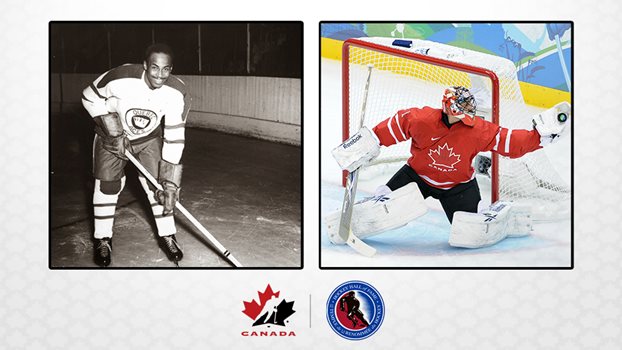
Dynamic duo headed to the Hall
Roberto Luongo and Herb Carnegie join four others in Class of 2022 for Hockey Hall of Fame
Two standout Canadians will be represented when the Class of 2022 goes into the Hockey Hall of Fame this fall.
Of the six names announced Monday, two have connections to Hockey Canada—legendary netminder Roberto Luongo will be enshrined in the player category, while Herb Carnegie will go in as a builder.
A closer look at the inductees…
Few goaltenders can match the international résumé of Roberto Luongo, who played 34 games across 10 events spanning 17 seasons, from the 1998 IIHF World Junior Championship to the 2014 Olympic Winter Games.
After earning Top Goaltender and Media All-Star Team honours at the 1999 World Juniors in Winnipeg, backstopping Canada to a silver medal, Luongo played in four IIHF World Championships in a five-year span from 2001-05, winning back-to-back gold medals in 2003 and 2004. Overall, only Sean Burke and Cam Ward have spent more time in the Canadian net at worlds than Luongo (856 minutes played).
In addition to his place on Canada’s championship-winning entry at the 2004 World Cup of Hockey, the Montreal product was also part of three Canadian contingents at the Olympic Winter Games, most notably at the 2010 Games in Vancouver when he capped his tournament with a 34-save effort in the gold medal game win over the U.S.
Honoured posthumously, Herb Carnegie is revered as one of the best players of his time and a pioneer for Black players in Canada. Carnegie battled racism and discrimination throughout his entire playing career, with many holding the view that he was kept out of the NHL simply because he was Black.
The Toronto-born forward was a standout in the Ontario and Quebec semi-professional leagues, earning three consecutive Quebec Senior Hockey League MVP awards from 1947-49. He joined the Quebec Aces in 1949-50 where he mentored another Canadian legend, Jean Béliveau—together winning the league championship in 1953. After retirement in 1954, he became a successful investor and founded one of Canada’s first hockey schools, the Future Aces, in 1955.
Carnegie’s family and friends had rallied together to get him into the Hockey Hall of Fame. They worked with the Hockey Diversity Alliance and created a petition to get him inducted in the Builder category to recognize his historic career that influenced generations of Black hockey players. Carnegie was also inducted into Canada’s Sports Hall of Fame in 2001 and the Ontario Sports Hall of Fame in 2014.
The duo will officially be inducted on Nov. 14 at the Hockey Hall of Fame in Toronto, joined by fellow inductees Daniel and Henrik Sedin, Daniel Alfredsson and Riikka Sallinen.
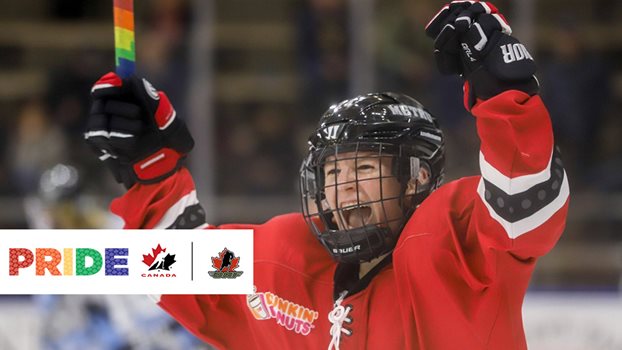
The power of visibility
A Team Canada alumnus, Isobel Cup champion and transgender advocate, Harrison Browne is using his platform to educate the hockey world and beyond
Hockey provided Harrison Browne with an opportunity to feel openly comfortable. It also granted him a voice to proudly discuss his journey.
Even in retirement, his message and leadership are important and welcomed, likely even more acoustically today than when he played.
“I wouldn’t be where I am today without hockey,” says Browne, a two-time Isobel Cup champion with the Buffalo Beauts of Premier Hockey Federation (PHF). “I wouldn’t be who I am and have the platform I have without hockey.
“Hockey was the first place that I felt comfortable to be myself and a place that I cultivated relationships where I felt supported and could trust people with my identity without judgment.”
As a transgender person and former athlete, Browne appreciates the forum he now possesses to talk, promote – and especially educate – about LBGTQ+ issues and acceptance.
It’s a podium that today permeates beyond hockey and into mainstream society.
“I didn’t set out to be an activist,” he says. “But then I saw the impact of trans visibility and LBGTQ+ visibility and I felt a responsibility to speak out, be vocal and visible to help anybody that can’t be visible like I can.
“I get very protective over my community so, yes, I do now consider myself an activist.”
Since June is Pride Month in Canada and across the world, it is widely used as an opportunity to support and celebrate LBGTQ+ people through parades, dances, festivals and other events.
For Browne, Pride Month is all of that and more.
“It’s about celebrating how far we’ve come and recognizing how far we need to go,” says the Toronto resident. “June is a great reminder of how strong this community is and how supportive we all are of each other.
“And it’s a great way to celebrate who you are as a person.”
Growing up in Oakville, Ont., Browne began playing hockey when he was nine years old, a “geriatric start” to the sport in his own words.
Regardless of when it commenced, it concluded as a solid career that lasted 16 years and included playing for Team Canada at the 2011 IIHF World Women’s U18 Championship and four years of college hockey in the United States, the last three on scholarship at the University of Maine.
From there, his time in the professional ranks stretched over three seasons in the PHF (known then as the National Women’s Hockey League), two with Buffalo and a final campaign in 2018 with the Metropolitan Riveters prior to retirement.
During his entire professional career, he was the first openly transgender athlete in a team sport.
Now 29, Browne has shifted his focus to public speaking and a vibrant acting career, both of which are conduits for trans and LBGTQ+ visibility and advocacy.
“I’ve been very fortunate,” he says. “After I retired from the game, I’m still a voice that people look to in the hockey community. I kind of meshed it with my acting. To be able to have those two worlds align, I certainly feel like I have a voice. And it’s something that I don’t take lightly and I’m very proud of.”
Browne’s appearances include celebrity hockey games and functions, keynote speeches, Scotiabank television commercials and an appearance in an episode of The Last Man, a TV drama series based on the comic book set by the same name.
By his own admission, Browne’s new career and schedule doesn’t permit much time for recreational hockey, something he laments.
However, he will always cherish the game for what it provided prior to his coming out, but especially after he did in 2016.
He said the PHF, its fans and teammates were extremely supportive during his social transition in what also became a pivotal period for LBGTQ+ inclusion in sports.
“They all helped me embrace who I am,” says Browne. “When I came out through hockey, I felt being visible helped a lot of people and the hockey community really helped me.”
Browne believes women’s hockey has been instrumental in inclusiveness, acceptance and a beacon for other sports to follow in pursuit of LBGTQ+ visibility and equality.
“The women’s side is exemplary on how other sports and society as a whole can include the LBGTQ+ community and celebrate people for their differences,” he says. “And to look at people simply as teammates.”
What does concern Browne in this month of celebration are some additional barriers that restrict further progressive movement for the LBGTQ+ community.
The recent influence of “non-inclusive” bills and legislation across North America has created some deep concerns.
In some jurisdictions these laws or bans specifically hinder younger LBGTQ+ people from playing sports and that is a step backwards in our society, according to Browne.
“It’s unfortunate that it comes with people having to fight back, but I have seen a lot of progress in the last five years.
“We’re in a moment right now where we’re fighting for our place, but I do see a lot of hope.”
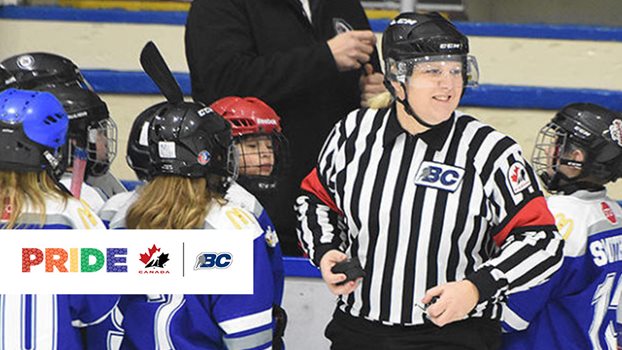
With pride and authenticity
After transitioning in 2018, Dee McWatters is working to create a safe and comfortable space for other transgender members of the hockey community
For Dee McWatters, pride comes with respect, honour, determination and – most of all – acceptance.
The Summerland, B.C., minor hockey official and adult-league goaltender opened up to her community and world as transgender in 2018, announcing her intentions of transitioning from male to female.
As an official in the Penticton Minor Hockey Association and part of a women’s team, hockey has helped McWatters through her challenges.
“It’s beyond me,” she says of being readily accepted. “Let’s face it, sometimes the game has its male-dominated machismo, and it’s not the most comfortable place to come out.
“I remember what locker-room talk was like [when] I was a teen. It was a different era, but now my kids have spent time coaching and are the ones in the dressing room. Now they have the opportunity to be the influence in the room to provide that safe environment. It’s about sharing the game, allowing people to be diverse and be themselves.
“That future McDavid Gretzky or Ovechkin – it’s possible they may have come and gone because they left the sport at 14 because they just felt this is not a place where [they] feel comfortable,” McWatters, 48, says. “That would be a shame if that has happened. There shouldn’t be anyone who leaves the game because of how they may identify. They should be welcomed. We’re getting closer.”
McWatters, who also works as an operations manager with Time Family of Wines, now works to build a comfortable space for other transgender athletes.
After she came out to herself five years ago, McWatters remembers sharing her transition with the rest of her hockey community.
"aAt the time, I was doing more coaching and officiating in Summerland. I let the association know what I was going through with my transition, to not let it affect anything with my coaching and make sure they had my support, because they’re supposed to support me.”
She was officiating and not playing at the time.
“As a goaltender, I wasn’t really big on regular men’s beer league. I enjoyed refereeing it. It was good exercise and I made a couple of bucks. Then a few years ago I [officiated] a few games in the South Okanagan Women’s League and at the wind-up party someone asked me if I still played.
“I said, ‘Not really, I do coach and it’s been a while since I was in the net.’ And they were like, ‘You’re a goalie? That’s even more important.’ I said, ‘Well I’m not fully female yet.’ They said, ‘Yes you are. You identify as a female. Totally, yes, you’re one of us.’
From there, McWatters rediscovered her love of the game as a player, joining another team in the fall of 2019.
“only one of the girls knew me and they were like, ‘Who’s this new goalie we’re trying out? She’s awesome. Is she staying with us this season?’ I was just fully accepted as one of the ladies playing the game and I loved it.”
That’s when McWatters also found out about an all-transgender team competing in Boston, playing a weekend of games facing Boston Pride’s gay hockey team, with another event planned in Madison, Wisconsin the following year.
“I wanted to go to [Madison] and I raised some funds to go and had so much support that I turned it into a fundraiser for local youth LGBTQ programs. Then the [COVID-19] pandemic hit and Madison did not eventually happen. Hockey took a turn for a season and life went on,” she remembers.
“Things started lifting last year and I held another fundraiser and supported five different youth organizations, two local high school bursaries and donated money to Team Trans North America, to help fund those who otherwise couldn’t afford to go to one of our tournaments.”
She eventually competed in Wisconsin last year, playing at age 47, and was encouraged by seeing young athletes in their 20s being able to play the game they love as their authentic selves.
McWatters’ inspiration turned to action as she approached BC Hockey about developing an educational program to promote more diversity and support for hockey associations.
She was recently involved in a Zoom meeting with Kamloops Minor Hockey where a friend of hers is on the executive.
“They have a player [and their] family going through transitioning, and they want to make sure they have all the proper pieces in place to support the player and family so that they can move forward,” says McWatters, who was more than willing to help.
“That’s what I want to do, make sure no one leaves our game. They enjoy playing the game and they shouldn’t be pushed out because they’re uncomfortable as a person, whether they identify differently or whether their sexual orientation or preferences are different. It shouldn’t matter as we’re all just here to play this wonderful game of hockey.”
She also officiated at the girls’ provincial U15 tournament in Kelowna.
“I had the support of the Penticton Minor Hockey referee-in-chief to attend, but it was more that I wanted to show some visibility and spread the message that there are people like me in the game,” McWatters says.
“I am very visible. I never forget that I’m there to officiate, but I also want people to see who I am so that there might be some identifying young player or coach or fellow official that sees me out there and realizes, ‘I can be me and still stay in this game that I love.’”
In a sport she has adored since she started at eight years old before taking up officiating at 12, she now hopes to be a role model; McWatters encourages people to ask questions how they can support players in a similar position.
“I have gone through many steps, from accepting who I was, to others accepting, to my social transition, to my medical transition,” she shares. “I have gone through hormone replacement and gender reassignment surgery. That’s not the end-all, be-all for everybody. That was my choice. But I live every day completely and authentically as the female that [I] was meant to be inside.”
Mario Annicchiarico is a freelance writer based in Victoria who has previously covered the National Hockey League’s Edmonton Oilers, as well as the Western Hockey League.
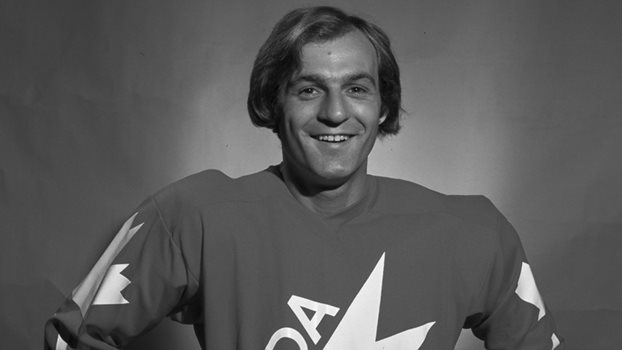
Guy Lafleur: 1951-2022
Hockey Canada sadly acknowledges the passing of the hockey legend, Team Canada alumnus and Order of Hockey in Canada honouree
It is with a heavy heart that Hockey Canada acknowledges the passing of Guy Lafleur.
One of the greatest French-Canadian stars in the history of the game, Lafleur, 70, was announced as a 2022 Distinguished Honouree of the Order ofHockey in Canada in January.
He will be posthumously invested into the Order during the Hockey Canada Foundation Gala in Niagara Falls, Ont., on June 23, alongside Lanny McDonald and Kim St-Pierre.
“Hockey Canada is deeply saddened to learn of the passing of hockey icon and 2022 Distinguished Honouree of the Order of Hockey in Canada, Guy Lafleur,” said Hockey Canada CEO Tom Renney, and president and COO Scott Smith. “On behalf of our entire organization, our deepest sympathies are with his wife Lise, his children Mark and Martin, his entire family, friends and all those who knew Guy and were privileged to play the game both alongside him and against him.
“Guy not only impacted the game, but changed how it was played. He was a hero to all those in Quebec, across the country and around the world. He was a true ambassador for the sport.”
The native of Thurso, Que., represented his country on three occasions – at the 1976 and 1981 Canada Cups, and at the 1981 IIHF World Championship. He recorded four goals and 14 assists in 21 Team Canada games, helping Canada to the 1976 Canada Cup title.
Lafleur is a Montreal Canadiens icon, spending 14 seasons in the bleu, blanc et rouge from 1971 to 1985, leading the Habs to five Stanley Cup championships (1973, 1976, 1977, 1978, 1979) and finishing his career as the franchise’s all-time leading scorer with 1,246 points (518-728—1,246) in 961 games. His No. 10 was retired by the Canadiens in 1985.
Honoured as one of the 100 Greatest NHL Players, he was a two-time Hart Trophy recipient as NHL MVP (1976-77, 1977-78), a three-time Art Ross Trophy winner (1975-76, 1976-77, 1977-78) and a six-time First Team All-Star (1974-75, 1975-76, 1976-77, 1977-78, 1978-79, 1979-80), among countless other awards.
Lafleur’s impact transcended hockey; he earned the Lou Marsh Trophy as Canada’s top athlete in 1977, the year he set a career high with 136 points before adding another 26 in the playoffs, taking home his only Conn Smythe Trophy as playoff MVP.
His offensive exploits in junior hockey were even more outrageous than his NHL accomplishments; in his final two QMJHL seasons with the Quebec Remparts, Lafleur posted a remarkable 233 goals and 379 points, including a 130-goal season in 1970-71, when he captained the Remparts to the Memorial Cup title.
He was inducted into the Hockey Hall of Fame in 1988, the same year he ended his three-year retirement and returned to the NHL with the New York Rangers. He spent one season on Broadway and two more with the Quebec Nordiques before calling it a career for the final time in 1991.
Lafleur was a 1996 inductee into Canada’s Sports Hall of Fame and a 1993 inductee into the Pantheon des sports du Québec, was invested as an Officer of the Order of 1980 and was made a Knight of the National Order of Quebec in 2005.
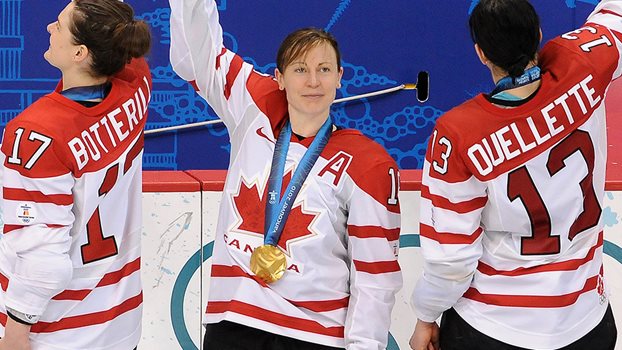
A hometown honour
With Canada’s National Women’s Team in Kingston, Ont., for the Rivalry Series, Team Canada icon and local legend Jayna Hefford is getting a hero’s welcome
Kingston, Ont., is known for producing some incredible hockey talents, including one of the best to ever lace up her skates with Canada’s National Women’s Team—Jayna Hefford.
Four Olympic gold medals (five medals in all). Seven gold medals at the IIHF Women’s World Championship. The second-most goals, third-most assists and second-most points in Team Canada history. And a 2018 inductee into the Hockey Hall of Fame.
On Sunday night in her hometown comes another honour. In recognition of all she’s done and continues to do for the game, Hefford’s Greater Kingston Girls Hockey Association (GKGHA) jersey will be raised to the rafters of the Leon’s Centre prior to the Rivalry Series game between Canada and the United States.
Hefford started her hockey career at six years old before making the move to the women’s game at 10 and playing with the Kingston Kodiaks (now the Greater Kingston Ice Wolves) through to her university career with the University of Toronto.
“I always felt like it was a really supportive community,” says Hefford, who was also a 2019 Distinguished Honouree of the Order of Hockey in Canada. “And thankfully I grew up in a family that encouraged me to follow my dreams. They could tell how much I loved the game.”
Now—having cemented her place in Canadian hockey history—Hefford has turned her attention to the growth of the game for the next generation.
Along with her hockey school in Kingston and the skill camps she runs in communities across Canada, Hefford is the operations consultant for the Professional Women’s Hockey Players Association (PWHPA), helping the organization work towards its goal to provide a viable professional hockey league for women.
“She's always giving back to the community by coming back,” says Jonathan Walker, president of the GKGHA. “She's hosted hockey camps through the summer and those things are loved by our members and they're heavily attended.
“Having someone like that, that can come back, [bringing] national team players with her and just the sheer visibility of women who have excelled in the sport and giving back to our young athletes has always been a great benefit to us.”
The Ice Wolves have seen registration growth in recent years, increasing their membership from 695 in the 2019-20 season to 755 in 2021-22 with the return to hockey.
Kingston will welcome the best of the women’s game once again on Sunday night, playing host to the first Canadian stop of the Rivalry Series.
“Hosting [games like this] in our community is a real honour,” Walker says. “For us to get exposure and to be able to see these high-level athletes is really exceptional for our community and for our girls to witness.”
An eager Kingston hockey community jumped at the opportunity to watch Canada’s National Women’s Team compete live, with the game selling out in just a matter of days.
“[That] made me really proud to see that,” Hefford says. “Kingston's a big hockey community, but the way they're supporting the women's game is really, really incredible. I'm so excited for the players to be able to play in a place like this.”
Hefford will be the first women’s hockey player to have her jersey honoured in Kingston, joining eight men who played for the Kingston Frontenacs of the Ontario Hockey League – Chris Clifford, Keli Corpse, David Ling, Ken Linseman, Tony McKegney, Mike O’Connell, Brad Rhiness and Mike Zigomanis.
“I hope it's a signal to every young girl and boy in that community that if you're passionate about something and you work hard for it anything's possible,” Hefford says of the honour.
“When [I was] growing up, you never would have seen a female hockey player celebrated like this in the community. It just wasn't something that girls did. Now I think it'll be a powerful thing for young girls to see.”
Watch the Jayna Hefford ceremony and the Rivalry Series game on Sunday at 5 p.m. ET/2 p.m. PT on TSN.
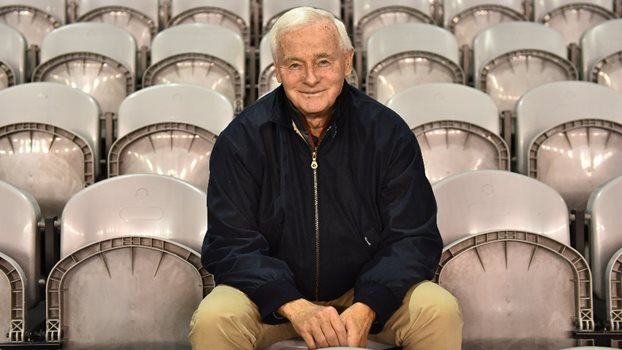
Loose Pucks and Ice Bags
A legend in the coaching world, Dave King has pulled together notes from close to five decades in the game for a new book geared towards coaches, players and parents
There aren’t many people in the game of hockey who have seen, experienced, and accomplished more than Dave King.
For 45 years, starting with his first coaching job with the University of Saskatchewan in 1972 and concluding with being assistant bench boss for Canada’s men’s team at the 2018 Olympic Winter Games, King coached and taught the sport at various levels, from the aforementioned university level to the professional ranks, including the National Hockey League and pro leagues in Germany, Russia and Sweden.
Along the way, the North Battleford, Saskatchewan-born King kept copious notes of what he witnessed, taught and learned to one day put it all together and release a book. Earlier this year, that day came as King released Loose Pucks and Ice Bags: How and Why the Game is Changing.
“Over the years, doing so many coaching clinics and conferences and stuff, a lot of times coaches would come up and ask different questions so I started to realize doing a coaching clinic is good – you get to answer some of the questions. But you can’t remember the whole, complete game,” King says from his winter home in Phoenix. “I’ve always kept pretty meticulous notes on certain aspects of the game and, when you coach as long as I have and in as many different countries as I have, you start to get a big broad picture of why certain countries play the game differently than we do. I have always tried to keep track of my observations of the game knowing that, at some point in time, I was going to do this book when I retired. I tried to collect a lot of good things that I thought were appropriate for coaches, parents and players, put it into a book and try to help people understand the game more and, hopefully, have more fun coaching it and doing it.”
King, a Distinguished Honouree of the Order of Hockey in Canada who coached Canada’s men’s team at three Olympic Games (1984, 1988 and 1992), believes his new book is targeted to three audiences – hockey coaches, players and parents.
Coaches will benefit by King’s experience in his travels all over the world, and what he’s picked up on from the teams he’s coached but also from some other well-known coaches in the game like Herb Brooks and Clare Drake.
Players can read the book and likely find some tactics their own coaches may be trying to teach them. Sometimes, having a second voice, especially one with the experience King has, could help that player better understand a specific tactic or part of the game they are trying to improve upon.
Finally, King says parents will find good use in the book, as they’ll develop a better sense of what their child is going through as they practice and play the great sport of hockey.
“For the parent, it’s important that parents watch their kids play. I think that’s really important,” says King. “But I do believe that, often, parents forget how difficult the game is to play. The game gets faster, the players get bigger and stronger, all those issues. They would understand how challenging it is to be a hockey player. Parents have to be supportive, patient hopefully, and this book might give parents some insight where they become a little more patient with their child and say ‘Hey, it’s hard enough to play. I’m going to be more supportive than I am critical.’”
The title of the book comes from King’s childhood and is a slogan he’s used for many of his teams. King says that, as a kid, he learned from coaches about the importance of getting to the loose pucks on the ice. As he describes it, when you’re in possession of the puck, you’re generally in control of the game. As for ice bags, that’s a reference to the importance of effort.
“You have to make sure you’re always working hard and giving a good effort,” says King. “If you do that, you’re going to be engaged in the game. If you’re engaged in the game, you do get some bumps and bruises so you do need some ice bags after the game.”
Readers will also learn of many of the changes in the game that have taken place to get us to where we are today, including the NHL recognizing the NHL Players’ Association in the late 1960s to the popularity of NHL clubs hiring college coaches in the 1980s to the major rules changes in 1999-2000 when the NHL wanted more offence in the game.
Loose Pucks and Ice Bags: How and Why the Game is Changing is available in bookstores and on Amazon.ca. All proceeds from sales will be donated to Hockey Canada to aid in the development of the next generation of players.
ENDORSEMENTS:
“Kinger is one of the greatest hockey minds of all time. He has coached at every level in numerous countries. His experiences provide him with an unbelievable education that he has shared with coaches and players, to improve the way the game is coached and played.” -- Mike Babcock
“To this day, I have not met a smarter hockey coach or better mentor for coaches worldwide.” -- Dave Tippett
“An insightful look into the game’s evolution from one of hockey’s most progressive minds.” -- Barry Trotz
For more information: |
- <
- >
